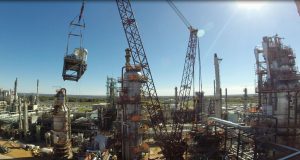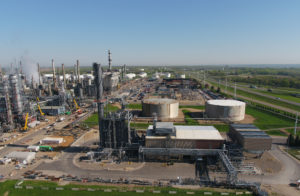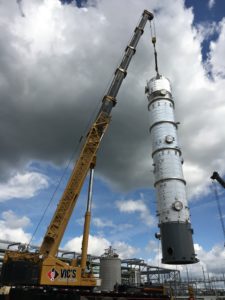Investing in our future

Flint Hills Resources Pine Bend refinery is one of America’s most energy efficient fuel producers and is committed to maintaining and enhancing its state-of-the-art facility. In the last 10 years, work at the refinery has been the equivalent of building at least two Vikings stadiums.
Since 2015, Flint Hills Resources has invested $500 million in technology and efficiency improvements to help the refinery lower emissions while producing more of the fuel and other products people need and use every day. These investments contributed to the Pine Bend refinery being ENERGY STAR® certified by the U.S. Environmental Protection Agency five years in a row.
These projects include:
Solar power project
Flint Hills Resources constructed what is believed to be the largest solar installation in the country that is designed to directly power a single facility or business. The 45-megawatt, $75 million solar development includes more than 120,000 solar panels and provides direct power to the Pine Bend refinery. The solar development is located on more than 350 acres of the company’s property immediately adjacent to the refinery complex.
The use of solar power improves the refinery’s energy efficiency, which is already among the best in the nation, and helps reduce emissions. The project will also lower energy costs helping make the refinery more competitive. Forty-five megawatts is enough electricity to power more than 8,400 homes per year, or roughly 30% of the refinery’s power needs during optimal conditions.
Ammonium thiosulfate technology and distribution terminal 
Pine Bend’s new ammonium thiosulfate (ATS) technology and distribution terminal allows the refinery to convert a traditional source of air pollution from motor fuels (sulfur) into a valuable fertilizer product that benefits farmers and the environment. The largest application of ATS technology in the world, this system also helps the refinery produce ultra-low sulfur gasoline, which lowers vehicle emissions and is better for the environment.
Combined heat and power system
The refinery’s new Combined Heat and Power (CHP) system is among Minnesota’s most efficient sources of electric energy generation, providing about 50 megawatts of electricity, or roughly 40% of what is required to power the refinery’s operations.
New heaters and improved heating elements
New and more efficient heating elements are expected to lower the refinery’s overall NOx emissions by nearly 150 tons per year or 13%. The replacement of two 1950s heaters – and the refinery’s largest single source of heater NOx emissions – with two new, state-of-the-art heaters, help convert a less valued asphalt-like material to gasoline and diesel fuel to help better meet demand for these products.
Modernized cooling towers
Two modernized cooling towers allow the refinery to better and more efficiently control the need to rapidly heat and cool products. These improvements are expected to save more than 15 million gallons of water per year and reduce energy consumption by at least 10%.
New gasoil fractionator
 A new 670,000-pound gasoil fractionator, built in Cambridge, Minnesota and transported 60 miles to Pine Bend, will improve the refinery’s diesel fuel production. The fractionator, which measures nine stories tall, allows Pine Bend to more efficiently convert less useful gas oil material to diesel fuel to meet consumer demand.
A new 670,000-pound gasoil fractionator, built in Cambridge, Minnesota and transported 60 miles to Pine Bend, will improve the refinery’s diesel fuel production. The fractionator, which measures nine stories tall, allows Pine Bend to more efficiently convert less useful gas oil material to diesel fuel to meet consumer demand.
Wescott propane storage terminal
Flint Hills Resources recently acquired and upgraded a propane storage terminal – located in Inver Grove Heights and previously owned by Xcel Energy – to more efficiently manage propane inventories, especially during the winter months when demand is highest.
Inver Grove Heights storage tanks
Flint Hills Resources acquired and upgraded storage tanks along 117th Street in Inver Grove Heights previously owned by Xcel Energy. The project helps the refinery more efficiently manage product inventories, especially during maintenance events, so it can continue to meet demand even when operating at reduced capacity.
In 2016, Flint Hills Resources completed construction of a new contractor building and a new high-tech testing laboratory where scientists perform about 35,000 product-quality tests each month. These construction projects totaled an approximately $31 million investment and created more than 151,500 square feet of new work space for scientists, engineers, designers, and construction managers.
